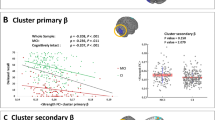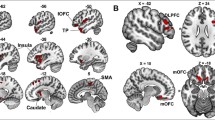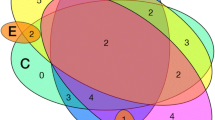Abstract
Amnestic Mild Cognitive Impairment (aMCI) represents the transition between healthy aging and Alzheimer’s dementia (AD) wherein gradual impairment of cognitive abilities, especially memory sets in. Impairment in episodic memory, especially delayed recall, is a hallmark of AD and therefore, patients with aMCI with more severe impairment in episodic memory are considered to be at greater risk of imminent conversion to AD. Brain structural and functional abnormalities were examined by comparing gray matter volumes, white matter micro-structural integrity and resting state functional connectivity (rsFC), between patients with aMCI (n = 46) having lower vs. higher episodic memory delayed recall (EM-DR) performance scores, correcting the influences of age, sex, number of years of formal education and total brain volumes using voxel-based morphometry, whole-brain tract based spatial statistics and dual regression analysis respectively. ‘Low’ performers (n = 27) when compared to ‘high’ performers (n = 19) showed significantly increased rsFC in the dorsal attention network (DAN) and central executive network (CEN) in the absence of demonstrable gray matter volumetric or white matter micro-structural integrity differences at family-wise error (FWE) corrected (p < 0.05) significance threshold. Follow-up data available for 38 (low performers = 22; high performers = 16) of the above 46 subjects (82.60% follow-up rate) over a median follow-up period of 24.5 months revealed that 7 subjects (18.42%) had converted to dementia. These converted subjects included 5 of the 22 low performers (22.72%) and 2 of the 16 high performers (12.5%) within the follow-up sample (n = 38). The results of the study indicate that imminent conversion of aMCI to dementia is higher in low performers in comparison to high performers, which may be characterized by increased rsFC in task positive networks, viz., DAN and CEN, as opposed to gray or white matter structural changes. This finding, therefore, might be considered as a prognostic indicator of progression from aMCI to dementia.


Similar content being viewed by others
References
Albert, M. S., DeKosky, S. T., Dickson, D., Dubois, B., Feldman, H. H., Fox, N. C., … Phelps, C. H. (2011). The diagnosis of mild cognitive impairment due to Alzheimer’s disease: Recommendations from the National Institute on Aging-Alzheimer’s association workgroups on diagnostic guidelines for Alzheimer’s disease. Alzheimer’s & Dementia: The Journal of the Alzheimer’s Association, 7(3), 270–279. https://doi.org/10.1016/j.jalz.2011.03.008
Bagepally, B., John, J. P., Varghese, M., Halahalli, H. N., Kota, L., Sivakumar, P. T., … Jain, S. (2013). Relationship of clinical and cognitive variables with brain morphometric abnormalities in Alzheimer’s disease: A voxel based morphometric study using 3-tesla MRI. Aging and Disease, 4(5), 235–243. https://doi.org/10.14336/AD.2013.0400235
Balachandar, R., John, J. P., Saini, J., Kumar, K. J., Joshi, H., Sadanand, S., … Bharath, S. (2014). A study of structural and functional connectivity in early Alzheimer’s disease using rest fMRI and diffusion tensor imaging. International Journal of Geriatric Psychiatry, 497–504. https://doi.org/10.1002/gps.4168.
Barbeau, E. J., Ranjeva, J. P., Didic, M., Confort-Gouny, S., Felician, O., Soulier, E., ... Poncet, M. (2008). Profile of memory impairment and gray matter loss in amnestic mild cognitive impairment. Neuropsychologia, 46(4), 1009–1019. https://doi.org/10.1016/j.neuropsychologia.2007.11.019.
Beckmann, C. F., & Smith, S. M. (2004). Probabilistic independent component analysis for functional magnetic resonance imaging. IEEE Transactions on Medical Imaging, 23(2), 137–152. https://doi.org/10.1109/TMI.2003.822821.
Beckmann, C. F., DeLuca, M., Devlin, J. T., & Smith, S. M. (2005). Investigations into resting-state connectivity using independent component analysis. Philosophical Transactions of the Royal Society of London. Series B, Biological Sciences, 360(1457), 1001–1013. https://doi.org/10.1098/rstb.2005.1634.
Bharath, S., Joshi, H., John, J. P., Balachandar, R., Sadanand, S., Saini, J., … Varghese, M. (2016). A multimodal structural and functional neuroimaging study of amnestic mild cognitive impairment. The American Journal of Geriatric Psychiatry, 25, 158, 169. https://doi.org/10.1016/j.jagp.2016.05.001
Bosch, B., Arenaza-Urquijo, E. M., Rami, L., Sala-Llonch, R., Junqué, C., Solé-Padullés, C., et al. (2012). Multiple DTI index analysis in normal aging, amnestic MCI and AD. Relationship with neuropsychological performance. Neurobiology of Aging, 33(1), 61–74. https://doi.org/10.1016/j.neurobiolaging.2010.02.004.
Bruscoli, M., & Lovestone, S. (2004). Is MCI really just early dementia? A systematic review of conversion studies. International Psychogeriatrics, 16(2), 129–140. https://doi.org/10.1017/S1041610204000092.
Ciobica, A., Padurariu, M., Bild, W., & Stefanescu, C. (2011). Cardiovascular risk factors as potential markers for mild cognitive impairment and Alzheimer’s disease. Psychiatria Danubina, 23(4), 340–346.
Corbetta, M., & Shulman, G. L. (2002). Control of goal-directed and stimulus-driven attention in the brain. Nature Reviews. Neuroscience, 3(3), 201–215. https://doi.org/10.1038/nrn755.
Damoiseaux, J. S., Rombouts, S. a. R. B., Barkhof, F., Scheltens, P., Stam, C. J., Smith, S. M., & Beckmann, C. F. (2006). Consistent resting-state networks across healthy subjects. Proceedings of the National Academy of Sciences, 103(37), 13848–13853. https://doi.org/10.1073/pnas.0601417103.
De Vogelaere, F., Santens, P., Achten, E., Boon, P., & Vingerhoets, G. (2012). Altered default-mode network activation in mild cognitive impairment compared with healthy aging. Neuroradiology, 54(11), 1195–1206. https://doi.org/10.1007/s00234-012-1036-6.
DeCarli, C., Mungas, D., Harvey, D., Reed, B., Weiner, M., Chui, H., & Jagust, W. (2004). Memory impairment, but not cerebrovascular disease, predicts progression of MCI to dementia. Neurology, 63(2), 220–227. https://doi.org/10.1212/01.WNL.0000130531.90205.EF.
Douaud, G., Smith, S., Jenkinson, M., Behrens, T., Johansen-Berg, H., Vickers, J., et al. (2007). Anatomically related grey and white matter abnormalities in adolescent-onset schizophrenia. Brain: A Journal of Neurology, 130(Pt 9), 2375–2386. https://doi.org/10.1093/brain/awm184.
Filippini, N., MacIntosh, B. J., Hough, M. G., Goodwin, G. M., Frisoni, G. B., Smith, S. M., … Mackay, C. E. (2009). Distinct patterns of brain activity in young carriers of the APOE-epsilon4 allele. Proceedings of the National Academy of Sciences of the United States of America, 106(17), 7209–7214. https://doi.org/10.1073/pnas.0811879106.
Fillenbaum, G. G., Chandra, V., Ganguli, M., Pandav, R., Gilby, J. E., Seaberg, E. C., … Nath, L. M. (1999). Development of an activities of daily living scale to screen for dementia in an illiterate rural older population in India. Age and Ageing, 28(2), 161–168.
Fischer, P., Jungwirth, S., Zehetmayer, S., Weissgram, S., Hoenigschnabl, S., Gelpi, E., … Tragl, K. H. (2007). Conversion from subtypes of mild cognitive impairment to Alzheimer dementia. Neurology, 68(4), 288–291. https://doi.org/10.1212/01.wnl.0000252358.03285.9d
Fjell, A. M., Westlye, L. T., Amlien, I., Espeseth, T., Reinvang, I., Raz, N., … Walhovd, K. B. (2009). High consistency of regional cortical thinning in aging across multiple samples. Cerebral Cortex (New York, NY), 19(9), 2001–2012. https://doi.org/10.1093/cercor/bhn232.
Fox, M. D., & Raichle, M. E. (2007). Spontaneous fluctuations in brain activity observed with functional magnetic resonance imaging. Nature Reviews. Neuroscience, 8(9), 700–711. https://doi.org/10.1038/nrn2201.
Fox, M. D., Snyder, A. Z., Vincent, J. L., Corbetta, M., Essen, D. C. V., & Raichle, M. E. (2005). The human brain is intrinsically organized into dynamic, anticorrelated functional networks. Proceedings of the National Academy of Sciences of the United States of America, 102(27), 9673–9678. https://doi.org/10.1073/pnas.0504136102.
Fox, M. D., Corbetta, M., Snyder, A. Z., Vincent, J. L., & Raichle, M. E. (2006). Spontaneous neuronal activity distinguishes human dorsal and ventral attention systems. Proceedings of the National Academy of Sciences of the United States of America, 103(26), 10046–10051. https://doi.org/10.1073/pnas.0604187103.
Ganguli, M. (1995). A hindi version of the MMSE. In The development of a cognitive screening instrument for a largely illiterate rural elderly population in India (Vol. 10, pp. 367–377).
Ganguli, M., Dodge, H. H., Shen, C., & DeKosky, S. T. (2004). Mild cognitive impairment, amnestic type: An epidemiologic study. Neurology, 63(1), 115–121.
Good, C. D., Johnsrude, I. S., Ashburner, J., Henson, R. N., Friston, K. J., & Frackowiak, R. S. (2001). A voxel-based morphometric study of ageing in 465 normal adult human brains. NeuroImage, 14(1 Pt 1), 21–36. https://doi.org/10.1006/nimg.2001.0786.
Gorelick, P. B., Scuteri, A., Black, S. E., Decarli, C., Greenberg, S. M., Iadecola, C., … American Heart Association Stroke Council, Council on Epidemiology and Prevention, Council on Cardiovascular Nursing, Council on Cardiovascular Radiology and Intervention, and Council on Cardiovascular Surgery and Anesthesia. (2011). Vascular contributions to cognitive impairment and dementia: A statement for healthcare professionals from the american heart association/american stroke association. Stroke; a Journal of Cerebral Circulation, 42(9), 2672–2713. https://doi.org/10.1161/STR.0b013e3182299496
Greicius, M. D., Srivastava, G., Reiss, A. L., & Menon, V. (2004). Default-mode network activity distinguishes Alzheimer’s disease from healthy aging: Evidence from functional MRI. Proceedings of the National Academy of Sciences of the United States of America, 101(13), 4637–4642. https://doi.org/10.1073/pnas.0308627101.
Grön, G., & Riepe, M. W. (2004). Neural basis for the cognitive continuum in episodic memory from health to Alzheimer disease. The American Journal of Geriatric Psychiatry: Official Journal of the American Association for Geriatric Psychiatry, 12(6), 648–652. https://doi.org/10.1176/appi.ajgp.12.6.648.
Hoyle, D. C. (2008). Automatic PCA dimension selection for high dimensional data and small sample sizes. Journal of Machine Learning Research, 9, 2733–2759.
Littow, H., Huossa, V., Karjalainen, S., Jääskeläinen, E., Haapea, M., Miettunen, J., … Kiviniemi, V. J. (2015). Aberrant functional connectivity in the default mode and central executive networks in subjects with schizophrenia – A whole-brain resting-state ICA study. Frontiers in Psychiatry, 6. https://doi.org/10.3389/fpsyt.2015.00026
Liu, J., Yin, C., Xia, S., Jia, L., Guo, Y., Zhao, Z., … Jia, J. (2013). White matter changes in patients with amnestic mild cognitive impairment detected by diffusion tensor imaging. PLoS One, 8(3), e59440. https://doi.org/10.1371/journal.pone.0059440.
Markesbery, W. R., Schmitt, F. A., Kryscio, R. J., Davis, D. G., Smith, C. D., & Wekstein, D. R. (2006). Neuropathologic substrate of mild cognitive impairment. Archives of Neurology, 63(1), 38–46. https://doi.org/10.1001/archneur.63.1.38.
Menon, V., & Uddin, L. Q. (2010). Saliency, switching, attention and control: A network model of insula function. Brain Structure and Function, 214(5–6), 655–667. https://doi.org/10.1007/s00429-010-0262-0.
Morris, J. C. (1993). The clinical dementia rating (CDR): Current version and scoring rules. Neurology, 43(11), 2412–2414.
Nir, T. M., Jahanshad, N., Villalon-Reina, J. E., Toga, A. W., Jack, C. R., Weiner, M. W., … Alzheimer’s Disease Neuroimaging Initiative (ADNI). (2013). Effectiveness of regional DTI measures in distinguishing Alzheimer’s disease, MCI, and normal aging. NeuroImage. Clinical, 3, 180–195. https://doi.org/10.1016/j.nicl.2013.07.006
Pariente, J., Cole, S., Henson, R., Clare, L., Kennedy, A., Rossor, M., … Frackowiak, R. S. J. (2005). Alzheimer’s patients engage an alternative network during a memory task. Annals of Neurology, 58(6), 870–879. https://doi.org/10.1002/ana.20653
Peters, R. (2006). Ageing and the brain. Postgraduate Medical Journal, 82(964), 84–88. https://doi.org/10.1136/pgmj.2005.036665.
Qi, Z., Wu, X., Wang, Z., Zhang, N., Dong, H., Yao, L., & Li, K. (2010). Impairment and compensation coexist in amnestic MCI default mode network. NeuroImage, 50(1), 48–55. https://doi.org/10.1016/j.neuroimage.2009.12.025.
R Core Team. (2001, March 2). R: The R Project for Statistical Computing. Retrieved July 6, 2015, from https://www.r-project.org/
Sano, M., Raman, R., Emond, J., Thomas, R. G., Petersen, R., Schneider, L. S., & Aisen, P. S. (2011). Adding delayed recall to the Alzheimer disease assessment scale is useful in studies of mild cognitive impairment but not Alzheimer disease. Alzheimer Disease and Associated Disorders, 25(2), 122–127. https://doi.org/10.1097/WAD.0b013e3181f883b7.
Seeley, W. W., Menon, V., Schatzberg, A. F., Keller, J., Glover, G. H., Kenna, H., … Greicius, M. D. (2007). Dissociable intrinsic connectivity networks for salience processing and executive control. The Journal of Neuroscience, 27(9), 2349–2356. https://doi.org/10.1523/JNEUROSCI.5587-06.2007.
Smith, S. M., Jenkinson, M., Woolrich, M. W., Beckmann, C. F., Behrens, T. E. J., Johansen-Berg, H., … Matthews, P. M. (2004). Advances in functional and structural MR image analysis and implementation as FSL. NeuroImage, 23 Suppl 1, S208–219. https://doi.org/10.1016/j.neuroimage.2004.07.051.
Smith, S. M., Jenkinson, M., Johansen-Berg, H., Rueckert, D., Nichols, T. E., Mackay, C. E., … Behrens, T. E. J. (2006). Tract-based spatial statistics: Voxelwise analysis of multi-subject diffusion data. NeuroImage, 31(4), 1487–1505. https://doi.org/10.1016/j.neuroimage.2006.02.024
Smith, S. M., Johansen-Berg, H., Jenkinson, M., Rueckert, D., Nichols, T. E., Miller, K. L., … Behrens, T. E. J. (2007). Acquisition and voxelwise analysis of multi-subject diffusion data with tract-based spatial statistics. Nature Protocols, 2(3), 499–503. https://doi.org/10.1038/nprot.2007.45
Takayama, Y. (2010). A delayed recall battery as a sensitive screening for mild cognitive impairment: Follow-up study of memory clinic patients after 10 years. Journal of Medical and Dental Sciences, 57(2), 177–184.
Tervo, S., Kivipelto, M., Hänninen, T., Vanhanen, M., Hallikainen, M., Mannermaa, A., & Soininen, H. (2004). Incidence and risk factors for mild cognitive impairment: A population-based three-year follow-up study of cognitively healthy elderly subjects. Dementia and Geriatric Cognitive Disorders, 17(3), 196–203. https://doi.org/10.1159/000076356.
Tripathi, R., Kumar, J. K., Bharath, S., Marimuthu, P., & Varghese, M. (2013). Clinical validity of NIMHANS neuropsychological battery for elderly: A preliminary report. Indian Journal of Psychiatry, 55(3), 279–282. https://doi.org/10.4103/0019-5545.117149.
Tripathi, R., Marimuthu, P., Varghese, M., Kumar, K., Balachandar, R., & Bharath, S. (2015). Neuropsychological markers of mild cognitive impairment: A clinic based study from urban India. Annals of Indian Academy of Neurology, 18(2), 177–180. https://doi.org/10.4103/0972-2327.150566.
Wahlund, L. O., Barkhof, F., Fazekas, F., Bronge, L., Augustin, M., Sjögren, M., … Changes, On behalf of the E. T. F. on a.-R. W. M. (2001). A New Rating Scale for Age-Related White Matter Changes Applicable to MRI and CT. Stroke, 32(6), 1318–1322. https://doi.org/10.1161/01.STR.32.6.1318
Xie, S., Xiao, J. X., Gong, G. L., Zang, Y. F., Wang, Y. H., Wu, H. K., & Jiang, X. X. (2006). Voxel-based detection of white matter abnormalities in mild Alzheimer disease. Neurology, 66(12), 1845–1849. https://doi.org/10.1212/01.wnl.0000219625.77625.aa.
Yao, Z., Hu, B., Liang, C., Zhao, L., Jackson, M., & the Alzheimer’s Disease Neuroimaging Initiative. (2012). A longitudinal study of atrophy in amnestic mild cognitive impairment and Normal aging revealed by cortical thickness. PLoS One, 7(11), e48973. https://doi.org/10.1371/journal.pone.0048973.
Zhou, Y., Yu, C., Zheng, H., Liu, Y., Song, M., Qin, W., et al. (2010). Increased neural resources recruitment in the intrinsic organization in major depression. Journal of Affective Disorders, 121(3), 220–230. https://doi.org/10.1016/j.jad.2009.05.029.
Zhuang, L., Wen, W., Zhu, W., Trollor, J., Kochan, N., Crawford, J., et al. (2010). White matter integrity in mild cognitive impairment: A tract-based spatial statistics study. NeuroImage, 53(1), 16–25. https://doi.org/10.1016/j.neuroimage.2010.05.068.
Acknowledgements
The patients and their families, the staff members of Geriatric Clinic and Services as well as the technical personnel at the Department of Neuroimaging and Interventional Neurology (N.I.I.R), NIMHANS are acknowledged for their kind involvement in the study.
Funding
This study was funded by the Department of Science and Technology (DST), Government of India (Grant No. DST-SR/CSI/70/2011 (G) dated 20.03.2012 to Dr. Srikala.Bharath).
Author information
Authors and Affiliations
Corresponding author
Ethics declarations
Conflict of interest
Himanshu Joshi, Srikala Bharath, John P John, Shilpa Sadanand, Jitender Saini, Keshav Kumar and Mathew Varghese declare that they have no conflict of interest.
Ethical approval
All the procedures involving human subjects have been performed by approval with NIMHANS Institutional Ethics Review Board and in accordance with the 1964 Declaration of Helsinki and its later amendments or comparable ethical standards.
Informed consent
We confirm that informed consent was obtained from all the participants included in this study.
Additional information
Publisher’s Note
Springer Nature remains neutral with regard to jurisdictional claims in published maps and institutional affiliations.
Electronic supplementary material
ESM 1
(PDF 288 kb)
Rights and permissions
About this article
Cite this article
Joshi, H., Bharath, S., John, J.P. et al. Resting state functional connectivity abnormalities and delayed recall performance in patients with amnestic mild cognitive impairment. Brain Imaging and Behavior 14, 267–277 (2020). https://doi.org/10.1007/s11682-018-9974-1
Published:
Issue Date:
DOI: https://doi.org/10.1007/s11682-018-9974-1




